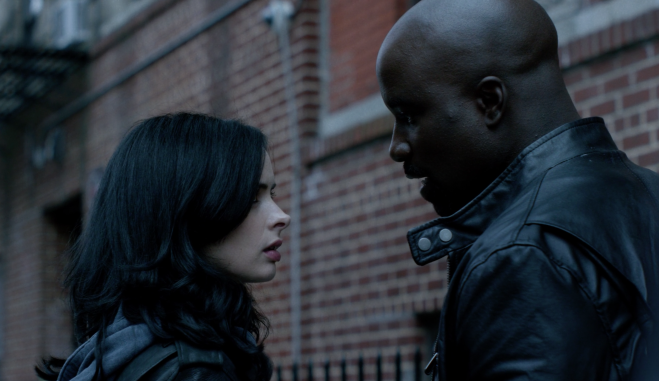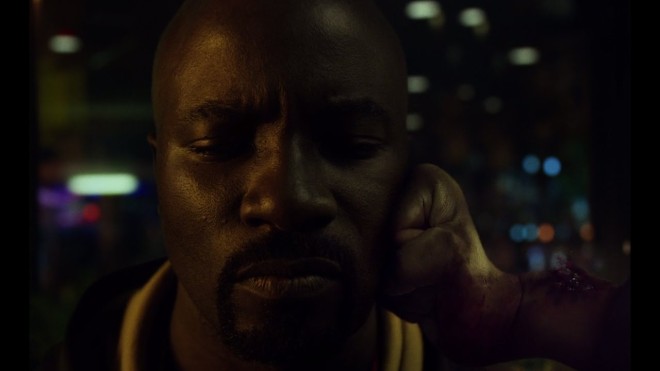So, I’m gonna be the guy who says that he didn’t like the first season of Luke Cage that much. It wasn’t anything wrong with the characters, per se. I loved most of the villains and the supporting characters and Cage himself, but I thought the pacing was awful and the dialogue was not great either. The music was amazing on every level, the themes were well-conveyed, and the acting was excellent, but I just felt like they wrote 8 episodes worth of plot and tried to stretch it into 13. I felt the same way about Jessica Jones, though, so maybe it was just a problem with how Netflix ordered the shows.

Now, I grew up reading the comics and I loved Luke Cage. Especially the older, campier adaptations of the character. After all, he’s the guy who once kicked Doctor Doom’s ass over his basic principle: A Deal’s A Deal. I always loved that aspect of Luke Cage, that he’s a man of his word and holds other people to theirs. Even among superheroes, Cage’s belief in personal responsibility and integrity was especially pronounced. Now, I’m not saying the show didn’t uphold that aspect of the character, but it tended to convert it into the swear jar more than the audacious Cage of old. Still, I believed Mike Colter as Luke Cage, just as a more modern, serious, version of the character.

SUMMARY OF JESSICA JONES, SEASON 1, AND THE DEFENDERS (*SPOILERS FOR THOSE*)
Luke Cage is a black superhero in Harlem who has unbreakable skin and superhuman strength. However, he is also an ex-convict, having escaped from prison after being framed for a crime while a police officer and forcibly experimented on by a secret lab. When we first see him in the show Jessica Jones, he’s a bartender who is hiding his superpowers and ends up becoming romantically involved with Jessica Jones (Krysten Ritter) until he finds out that she killed his wife while hypnotized by that show’s villain Kilgrave (David F*cking Tennant). Eventually Cage gets controlled by Kilgrave and turned against Jones, but Jones wins the fight by shooting him point-blank in the head with a shotgun, knocking him out. They don’t really talk for a while after that.

In the first season of Luke Cage, Cage is hiding in Harlem, working low-profile jobs at barbershops and nightclubs. He ends up getting involved in a series of gang problems after one of his mentors gets killed (this is a comic-book show, after all). Cage singlehandedly starts to devastate the local drug dealers and the gang leaders through destroying their buildings and hospitalizing their minions. Initially opposed by kingpin Cornell “Cottonmouth” Stokes (Mahershala Ali), Stokes is eventually killed by his cousin, councilwoman Mariah Dillard (Alfre Woodard), who starts to oppose Cage. However, Dillard is then supplanted by Diamondback (Erik LaRay Harvey), who is revealed to be Cage’s illegitimate brother who tries to kill him using special bullets and an exo-skeleton. Cage ends up surviving and taking down Diamondback in public as a hero before being re-arrested for his prison break, though a local police officer, Misty Knight (Simone Missick), finds the evidence to clear him.

In The Defenders, Luke Cage joins the other Netflix Marvel heroes to fight off the forces of the Hand, a group led by Sigourney Weaver that plans on opening an interdimensional portal for some reason that I honestly just don’t remember but think was tied into living forever. Either way, Cage reunites with Jones and meets Matt Murdock/Daredevil (Charlie Cox) and Danny Rand/Iron Fist (Finn Jones), who he becomes friends with after first fighting over their different lifestyles (Rand is a billionaire by inheritance whereas Cage is… not, while Rand had to work his whole life and beat a dragon in a fight to earn his superpowers but Cage spent a night in a chemical bath and got better ones). The team ends up victorious, but Cage is the only one that the public really hears about, since Jessica Jones is notoriously anti-social and both Rand and Murdock have secret identities.

OUTLINE OF SEASON 2 (SPOILER-FREE)
So, the beginning of season 2 finds Luke Cage as being a celebrity and the Hero of Harlem. He’s still dealing with “Black” Mariah Dillard, who is now the biggest crime boss in Harlem, but also has to deal with the arrival of John “Bushmaster” McIver (Mustafa Shakir), who is a Jamaican gang leader who has similar powers to Cage, except from a supernatural source. The season covers a gang war between the two over the fate of Harlem, with Cage caught in the middle and trying to fight for the soul of the neighborhood along with Misty Knight’s help.

Probably the biggest change in this season is that the “Judas Bullets” which were what actually hurt Cage in the last season, no longer work. Because of the last season’s events, Cage not only has bulletproof skin and super-strength, but any time you beat him up, his body heals stronger than it was before. This means that, throughout most of the season, nothing can hurt Cage and whatever does will be shortly overcome. It required the writers to find other ways to challenge him, something that sometimes worked and sometimes didn’t.
END SUMMARY
First off, they fixed most of the pacing issues in this show, even if the episodes sometimes feel a little slow. However, part of that is that they try to work musical performances in frequently as part of Harlem’s culture and it usually feels organic. The villains are a little more compelling and fleshed out this season than the previous one and the side characters are also a little more developed. Overall, the production of this season is a step up from the previous. But it’s the changing themes of the show that really were a little more hit-and-miss.
A big theme of the show at large is, naturally, racism, but this season didn’t actually try to address it as directly as the last. Instead, a lot of this season is about the nature of power. Not that power doesn’t intersect with racism, of course. It’s literally the backbone of all forms of discrimination: One group has power and uses it to keep another group from acquiring it. Sexism, racism, homophobia, you name it: If you don’t have power, then your desire to discriminate is useless.

The show goes into what really creates power in several forms. There’s wealth and status, shown through Mariah and other “Lawful Evil” characters who manage to avoid consequence by buying their way out of it, as well as Danny Rand, who uses it to help people. There’s celebrity, the power to avoid consequence through the adoration of the masses, which Luke himself is just learning how to wield in this season. Then, there’s physical power, as embodied by Luke and Bushmaster. And all of them are shown to be able to be used for both good and evil pretty equally.
However, as the season goes on, we see how a lack of consequences can influence people. It reminded me of the story of the Ring of Gyges.
I put a video of it explained to the Legend of Zelda above, but quick refresher: The Ring of Gyges is a story from Plato’s Republic in which a shepherd finds a golden ring which allows him to become invisible (Yes, this was written before Lord of the Rings). He then used the power of invisibility to commit a series of acts for which, of course, he is never blamed, since he’s never at the crime scene. Eventually, he seduces the queen and murders his king, taking the throne for himself. The myth is the subject of a discussion of whether or not moral character is dependent upon whether or not you can be held accountable for your actions.
The show takes a bunch of positions but, for the most part, the show says that good people will WANT someone there to hold them accountable for their bad decisions because they know that using power inherently will lead them to make bad decisions. But they won’t choose not to use the power, because, as another comic once paraphrased from a number of past sources, “with great power, there must also come great responsibility.”

In this season, Luke, at several points, realizes the truth of his situation: He can’t be brought to bear for his actions. He is sued at one point and arrested at another, which are attempts for the system to reign him in, but that quickly falls apart, both because he’s now famous enough to buy people off and because, as he says “no bullet can harm me, nothing can kill me, nothing can stop me, and no jail can hold me.” And throughout the season he realizes that this is not necessarily making him a better person.
However, what’s also interesting, though perhaps a little bit disheartening, is how Luke using his power of celebrity to do good also inherently leads to other people using his celebrity for their own gain. One of his friends sells “authentic” Luke Cage merchandise for profit. Others use his name to threaten people. At another point, Luke finds that his celebrity status and well-known do-gooder tendencies can work against him when Luke attempts to confront a jackass at a party. Luke’s threats towards him do nothing but amuse the man, who thinks that it’s just a thing that Luke Cage does.

Really, what I both loved and hated about the season is how it reminded me that everything always stems from violence. In the end, we pretend that there are all these societal rules that keep us in line, but they all can only ultimately be enforced by violence or the threat of violence. Sure, some people will voluntarily do the right thing, but for all the people that do the wrong thing, they can avoid responsibility for it until some form of violence is brought upon them, whether it’s the police, the mob, or the superhero. Violence is what keeps a lot of people in line. The show even demonstrates that, without some application of violence by some people, the chaos that ensues from removing any consequences creates significantly more violence.
However, it’s also true that the threat of violence is what’s most effective at keeping people suppressed, as the show discusses through violence against women in this season, as opposed to racial violence. I’m not sure how I feel about that, though I think that they actually manage to address the pervasive nature of gender-based violence in a reasonable manner, though it seemed to be dropped a little too quickly after the next plot point.
Ultimately, I recommend watching the season, but I’m not going to tell you to move it to the top of your queue. Still, even if it doesn’t do it perfectly, it’s trying to address something big, and that’s worth supporting.
If you want to check out some more by the Joker on the Sofa, check out the 100 Greatest TV Episodes of All Time or the Joker on the Sofa Reviews.
If you enjoy these, please, like, share, tell your friends, like the Facebook page (https://www.facebook.com/JokerOnTheSofa/), follow on Twitter @JokerOnTheSofa, and just generally give me a little bump. I’m not getting paid, but I like to get feedback.


